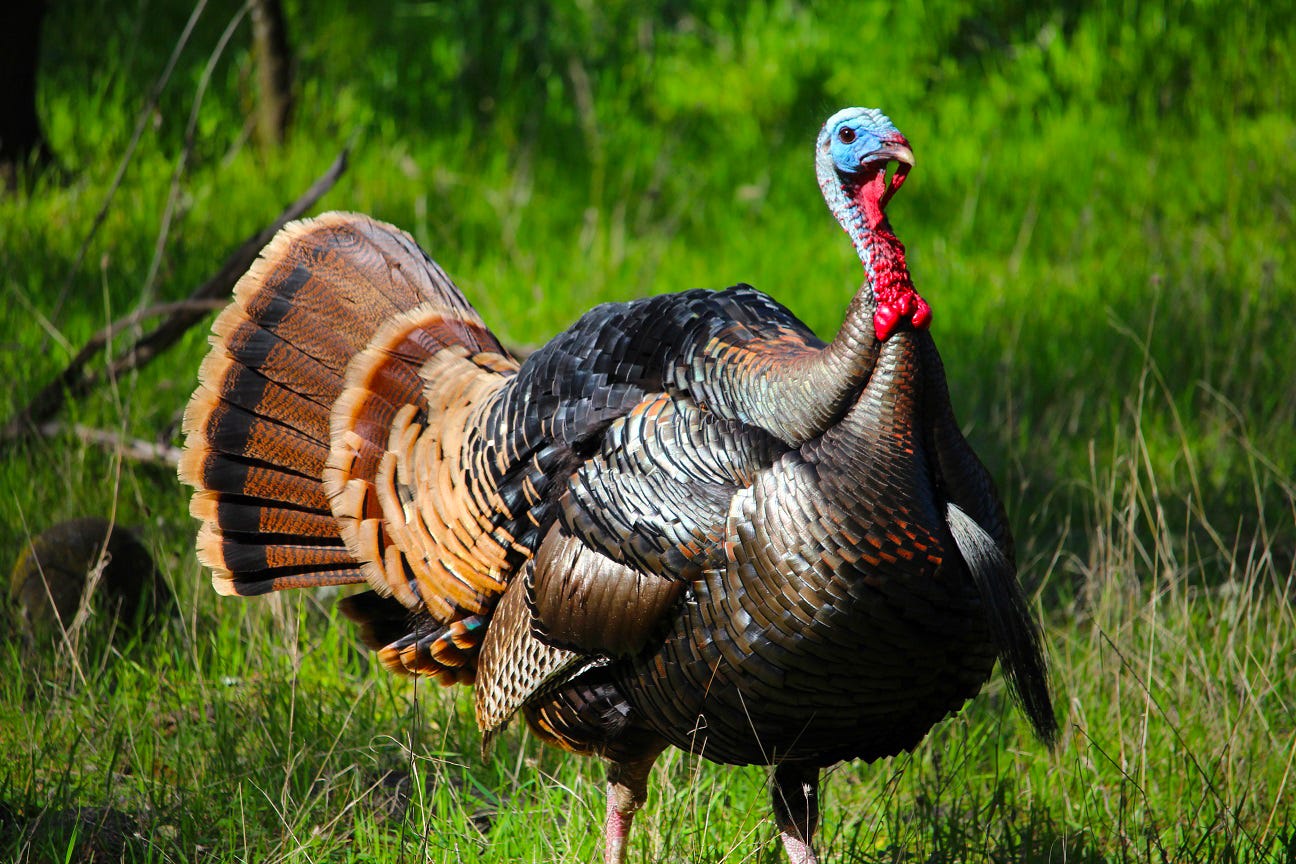Misplaced Trust: The Thanksgiving Turkey's Tale
Nassim Taleb's "1,001 Days, or How Not to Be a Sucker" applied to leadership. Part 1/8 in a long series about trust in the workplace, in our personal lives, and in general.
Happy Thanksgiving to my fellow Americans!
For readers outside the United States: Thanksgiving in the U.S. is traditionally1 a harvest festival that takes place on the fourth Thursday of November. Many Americans spend the holiday in a diabetic coma after binge-eating foods indigenous to the North and South American continents: corn, potatoes, pumpkin pie, and turkeys. Every year, in mid-November, American grocery stores begin overflowing with millions of turkeys in preparation for the Thanksgiving holiday.
The story of a Thanksgiving turkey’s life is an excellent starting point for the topic of trust in the workplace (or lack thereof). There’s no better time to start this Adventures in Leadership Land article series than on Thanksgiving Day itself!
1001 Days in the Life of a Thanksgiving Turkey
One of the single most impactful ideas responsible for shaping our thoughts was introduced in The Black Swan by Nassim Nicholas Taleb. We will liberally plagiarize cite several excerpts from the book because Taleb’s writing is more than adequate to convey the idea. And also because we’ll be busy preparing turkey carcasses to feed our families as you’re reading this.
Consider a turkey that is fed every day. Every single feeding will firm up the bird’s belief that it is the general rule of life to be fed every day by friendly members of the human race “looking out for its best interests” as a politician would say. On the afternoon of the Wednesday before Thanksgiving, something unexpected will happen to the turkey. It will incur a revision of belief.
[…]
How can we know the future, given knowledge of the past; or, more generally, how can we figure out properties of the (infinite) unknown based on the (finite) known? Think of the feeding again: What can a turkey learn about what is in store for it tomorrow from the events of yesterday? A lot, perhaps, but certainty a little less than it thinks, and it is just that “little less” that may make all the difference.
[…]
Consider that the turkey’s experience may have, rather than no value, a negative value. It learned from observation, as we are all advised to do (hey, after all, this is what is believed to be the scientific method). Its confidence increased as the number of friendly feedings grew, and it felt increasingly safe even though the slaughter was more and more imminent. Consider that the feeling of safety reached its maximum when the risk was at the highest! But the problem is even more general than that; it strikes at the nature of empirical knowledge itself. Something has worked in the past, until—well, it unexpectedly no longer does, and what we have learned from the past turns out to be at best irrelevant or false, at worst viciously misleading.
– Chapter Four: One Thousand and One Days, or How Not To Be a Sucker, pp. 40-41
Turkeys, Trust, and the Problem of Induction
Taleb’s idea is not new. Elsewhere in the chapter, he credits the original idea to the überphilosopher Bertrand Russell (whose story used a chicken, not a turkey). The concept illustrated by the 1,001 days of the Thanksgiving turkey is called the “problem of induction,” which was coined by the 18th-century philosopher David Hume. The basic idea is:
If you infer a generalized rule from experience, the next observation could always prove you wrong.
Let’s now consider our trust in friends, family, coworkers, and organizations. When we apply the problem of induction to our trust in others, we come to a bleak realization: the same hand that feeds you can be the one that wrings your neck.
Even more insidiously: the more days that pass without incident, the higher confidence you will have in your continued well-being. The other person will always appear most trustworthy just before the Sword of Damocles begins to fall. Then, like the Thanksgiving turkey, you will incur a revision of belief.
Let’s ditch the metaphors and examine some real-world examples of misplaced trust:
Trust in an organization: The receipt of steady paychecks lulls us into maximum complacency just before the mass layoffs begin.
Trust in a loved one: 25 years of marriage instills the greatest sense of stability and security until you’re blindsided by your spouse serving you with divorce papers.
Trust in an agent: The fund manager’s Ponzi scheme collapses just as your faith in his financial wizardry is highest.
Trust in a leader: A visionary CEO appears most capable of superhuman accomplishments just before their company implodes from an accounting scandal, a fraudulent product, or a bursting speculative bubble (in which the company was leveraged with Other People’s Money, of course).
Trust in a friend: When a serial killer or mass murderer appears on the news, journalists like to interview at least one friend or neighbor who never suspected the culprit was capable of such heinous crimes. After all, the perpetrator had reached a new record of “days without killing someone”…until they did.
What we find most disturbing is that it’s impossible to know whether your trust has been misplaced until the very end2. Between now and then, everyone and everything is capable of betraying you. There are no exceptions to this rule. Even the most loyal dog can contract rabies and degenerate into a feral beast. Even you can betray yourself, and it probably happens more often than you think. We’ll return to that in a later post.
For the mathematically-minded readers out there3:
Trustworthiness can approach the limit of 100% but never reach it.
The possibility of misplaced trust is always non-zero. To one degree or another, we are all turkeys.
I Don’t Want To Be a Turkey…
We didn’t write this article to sabotage your psychological safety, convince you to mistrust everyone, or melt you into a paranoid puddle of secrets and anxiety. We wrote this post to set the stage for the article series ahead, which will:
Plumb the depths of our foundational beliefs about trust. We will gain a better idea of what trust is by defining what it is not, per our devotion to via negativa
Offer you an alternate way to see the world and help you reshape your thinking about trust
Provide actionable advice on what to seek and what to avoid.
The problem of induction is ever-present and unavoidable, just as the Fog of Uncertainty is a persistent feature that shrouds the geography of Leadership Land. It literally “comes with the territory,” as the old saying goes.
However, just like fog in the real world, the metaphorical Fog of Uncertainty can range in density from a thin haze to “so thick you can’t see your outstretched hand.” By the end of the article series, we will help you (partially) disperse the Fog of Uncertainty and reduce your risk of becoming the turkey at someone else’s Thanksgiving dinner.
If you feel unsettled by the content of this article, consider this: we (the authors) believe that all people, including ourselves, cannot be fully trusted. Yet, we live fulfilling lives with spouses, friends, and family. We get along well with coworkers and discharge our duties to our employers. It’s fully possible to live in peace with this belief system while holding others close at heart. For now, please have faith that this apparent contradiction will be reconciled later in the article series.
We released this post early to coincide with Thanksgiving in the United States. You can consider this a “bonus” post, with the next article in the trust series coming out next week (around the end of November). Follow us on Twitter, LinkedIn, and Mastodon in case there are interruptions (e.g. illness from family gatherings). We are also active on Reddit.
How Do You Build Trust If You Don't Know What "Trust" Means?
Leadership books and training materials frequently cover topics related to “building and maintaining trust,” but have you heard anyone define what “trust” is? Most adults pick up an intuitive understan…
The day after Thanksgiving (“Black Friday”) is the unofficial start of the winter shopping season. Commercial activity on Friday has been steadily encroaching on the day before, with stores opening earlier and earlier. Some years, stores opened on the evening of Thanksgiving Day to lure in customers with the promise of deep discounts. American families were forced to choose between binge-shopping stuff made in China, versus American traditions like reuniting the family, sharing a large meal, and counting one’s blessings.
In some cases, even past the very end. There’s an old joke:
The difference between a prostitute and a lawyer is that the prostitute stops screwing you when you’re dead.
The entire practice of estate law is about preventing abuses after one’s death. We’ve heard horror stories of families torn asunder as the heirs fight over inheritances and estates. The death of the family matriarch seems to trigger a mutation from “well-behaved productive member of society” into “avaricious monster.”
We thought about modeling trustworthiness as a nonlinear function and putting it in limit notation, but we didn’t want to trigger Newtonian rage in professional mathematicians. For now, it suffices to say that trustworthiness has an asymptotic limit.





